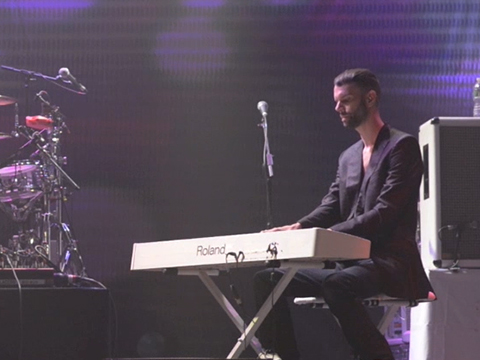When years have passed since a band last set foot in the United States, you'd think those clamoring for their return would get what they want when it's time to catch their favorite act live: all the hits. Placebo fans didn't get that, exactly, at the New York and Los Angeles shows the British alt-rock trio recently played, their first in six years. Placebo, who've sold 12 million records between their seven releases, are long overdue for a lap around the States, and they're eager to get back on the road (with a proper tour in the spring of 2014) to celebrate Loud Like Love, their lucky number-seven of an album, and a body of work that "speaks truth," they believe, in a way the more beloved songs of their catalog can't. Before playing a packed Terminal 5 in New York City, Placebo performed a ghostly, acoustic rendition of Loud Like Love's title track for our Live Sessions. We also sat down with singer Brian Molko and Stefan Olsdal backstage to talk about Loud Like Love, their complicated relationship with the songs of their present and past, and their plans for Placebo's triumphant American return.
ESQUIRE.COM: What do you think is going to be the biggest difference for your fans when they see you for the first time in six years?
BRIAN MOLKO: In 2007, we had a change in personnel for the first time in 11 years. It was quite a traumatic experience for us, but it was a necessary thing to do in order for the band to continue, really. Steve Forrest joined the band on drums. He'd never been out of the States before; he'd never been to Europe. He was very young, he was 22, and we embarked straight away on making the next record. I think that Battle for the Sun, Loud Like Love's predecessor, was the sound of a band trying to find a new identity, to find out who they were again. We had the same lineup for 11 years — to say that it was an amicable split would be lying. We were also in the process of recovery, and finding ourselves again, so now, with Loud Like Love, I think it's much more the sound of a band who's found itself and is very, very comfortable in its own skin... Finally, on both a songwriting and recording level, and as a touring unit and touring family, we're just really happy with who we are right now. It's quite unusual for a band that was fueled by dysfunction and tension and unease and confusion and anesthesia for many, many years. We feel like we're in a very privileged position. Stefan and I have been writing music together for 19 years now. We're very grateful and we realize what a privileged position we're in right now, to be making music, and that people still like want to hear us.
ESQ: I'm happy that a painful situation turned into a cathartic, productive period for you. I know that Loud Like Love is your seventh record, but this sounds more like a sophomore effort considering the dynamic you just described.
BM: We call it Placebo: Mach 3! [Laughs] Every time we change drummers we change epoch. We're on our third one now, third and hopefully last.
ESQ: So, "Loud Like Love," the song you played for us today: Can you tell us more about it?
BM: We wrote the first track on the album, "Loud Like Love," and the last one, "Bosco," at exactly the same time. They couldn't sound more different. They're basically polar opposites. "Loud Like Love" in its recorded version is a very optimistic and upbeat, enthusiastic song about unity and togetherness. "Bosco" is quite a sad story about a relationship that's been torn apart by addiction. When we came up with "Loud Like Love," it was borne out of a moment of complete boredom. We were in our writing studio in Spain, and we just didn't know what the hell to do. We just persevered until that came out. It was a complete release, and it seemed at the time to represent us coming together in our own. "Loud Like Love" is really quite ambiguous. I'm still working out exactly what it means to me. I'm quite happy about that because it means that each individual listener can live out their personal story through it.
ESQ: Does the performance of the song change every time you hit a different stage? Some musicians find comfort in routine by playing the same songs in the same sequence every night. Others don't write up a set list until they're about to go on, and they thrive on the spontaneity. Where does Placebo fall on that spectrum right now?
BM: We're definitely the former. It takes us quite a lot of time in rehearsals to get a set list that really works. It's very much dictated by our dysfunctional relationship with our back catalog. There are a lot of songs that we've avoided and released on previous albums, and we find it very difficult to play them live. What you get when you come to a Placebo show at any given time — you get the songs that we have an emotional connection to, the ones that don't make us feel uncomfortable when we're playing. There are a lot of songs that we've done that make us feel really uneasy and wrong inside, because it feels like we're not connected to them at that specific point in our lives. They're often some of our more commercially successful or more liked tracks, but we can't bring ourselves to go onstage and play them, because if they don't mean something to us today, it would be a mechanical act, an act that wasn't truthful. We didn't want to be in a band to not speak our version of our truth that's specific to that point in time. It feels like a lie to go on and play songs that you don't believe in, even though I'm sure the audience would love it.
ESQ: Which songs in particular are we talking about?
BM: "Pure Morning" was the song that kind of put us on the map in the U.S. A lot of people called it the "weed song." That's the main offender. There's a song called "Nancy Boy" that was our first big hit in Europe that opened a lot of doors for us, but we're not playing it today because I find it hard to sing those words. Maybe I will again at some point, but today, no.
ESQ: What have you missed the most about playing the States?
BM: Every time we come to the States we still feel like a new band, like a band that has to prove itself. I think that's important for us, right now, in our careers. It stops us from becoming complacent. In Europe, we have a much larger audience, so we have to sort of reapply for our jobs when we come to the States. That can only be a positive thing.
Video by James Joiner
PLUS: Watch More Esquire Live Sessions >>
Follow The Culture Blog on RSS and on Twitter at @ESQCulture.


